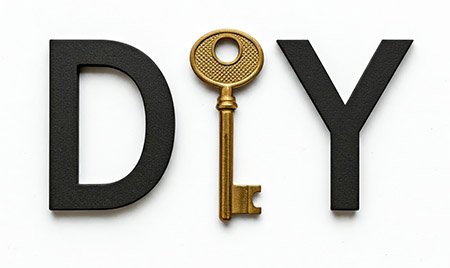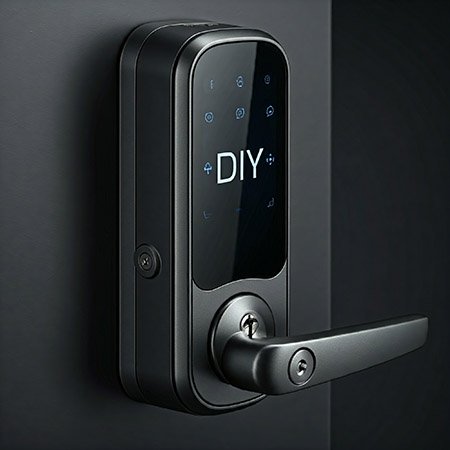 For those interested in improving their home security, DIY options for rekeying or changing locks are accessible and can be cost-effective with the right tools. Rekeying is typically more affordable than replacing an entire lock, as it involves modifying the existing mechanism to work with a new key. While hiring a locksmith costs between R250 and R500 per lock in most cases, a DIY approach allows you to save on labor fees. Keep in mind, however, that purchasing a rekeying kit or other tools might involve an initial investment. Changing a lock, which costs R350 to R800 professionally, is another option for homeowners comfortable with basic tools and following instructions.
For those interested in improving their home security, DIY options for rekeying or changing locks are accessible and can be cost-effective with the right tools. Rekeying is typically more affordable than replacing an entire lock, as it involves modifying the existing mechanism to work with a new key. While hiring a locksmith costs between R250 and R500 per lock in most cases, a DIY approach allows you to save on labor fees. Keep in mind, however, that purchasing a rekeying kit or other tools might involve an initial investment. Changing a lock, which costs R350 to R800 professionally, is another option for homeowners comfortable with basic tools and following instructions.
Tools and Tips for Rekeying
To rekey a lock yourself, a rekeying kit is essential. These kits usually include pins, springs, and instructions tailored to specific lock types. Alongside this, basic tools such as a Phillips screwdriver and pliers are necessary for disassembling and reassembling the lock. A flashlight can also help illuminate the mechanism, especially if you’re working in low light. For those undertaking multiple locks, investing in a professional-grade pinning kit might be worth considering, though these can cost around R4,000 or more. If you only need to rekey one or two locks, a basic kit is usually sufficient.
The rekeying process demands careful attention. Without the original key, the task can become more complicated and might require additional tools or expertise. Mistakes during the process, such as damaging pins or springs, could render the lock unusable, leading to higher costs in the long run.
Can You Rekey or Change Locks Yourself?
Yes, both rekeying and changing locks can be done by most homeowners. Changing a lock is particularly straightforward and often requires just a screwdriver. By unscrewing the old lock, following the installation instructions provided with the new one, and securing it properly, you can complete the job within an hour. However, for high-security locks or if you’re unsure of the process, it may be wise to hire a locksmith to ensure optimal installation and security.
Rekeying locks is also feasible for those with the right tools and patience. The process involves disassembling the lock, replacing the old pins with new ones that match your new key, and reassembling it carefully. While rewarding, it requires some mechanical aptitude and precision. If you’re uncertain, seeking professional assistance can save time and reduce the risk of damaging the lock.
DIY vs. Professional Assistance
While DIY lock rekeying and changing are viable options, consider the complexity of the task and your own skill level. Rekeying requires a steady hand and knowledge of lock mechanisms, and changing locks may lead to improper installation if not done carefully. For beginners or those dealing with high-security systems, hiring a locksmith ensures the job is completed correctly and efficiently. Professionals also bring the expertise needed to handle unforeseen complications.
Ultimately, whether you choose to rekey or replace locks depends on your confidence in managing the task, the tools available, and the type of lock involved. Both methods enhance security, but professional help is always an option if you’re unsure about the process.
Process and Practical Considerations for Rekeying Locks
 The time it takes to rekey a lock depends on the type of lock and the person performing the task. Professional locksmiths often complete the process within 10 to 40 minutes, with straightforward locks taking as little as 15 minutes. For more complex locking systems, the time can extend to 30 minutes or more. In DIY scenarios, the time frame may be longer, especially if you are unfamiliar with the steps or lack the right tools. Interestingly, the most time-consuming part is often removing the lock from the door, as the actual rekeying process is relatively quick once the lock is accessible.
The time it takes to rekey a lock depends on the type of lock and the person performing the task. Professional locksmiths often complete the process within 10 to 40 minutes, with straightforward locks taking as little as 15 minutes. For more complex locking systems, the time can extend to 30 minutes or more. In DIY scenarios, the time frame may be longer, especially if you are unfamiliar with the steps or lack the right tools. Interestingly, the most time-consuming part is often removing the lock from the door, as the actual rekeying process is relatively quick once the lock is accessible.
Determining whether your lock can be rekeyed is an essential first step. Most standard pin-tumbler locks are rekeyable, provided they are in good condition. If your lock operates smoothly and securely, it is likely suitable for rekeying. Rekeying is an excellent option if you’ve lost a key or need to enhance security without replacing the entire lock. However, locks that are damaged, excessively worn, or incompatible with rekeying—such as certain electronic models—may need to be replaced instead. If you’re uncertain about your lock’s suitability, a locksmith can help assess your options.
Rekeying a lock without the original key is also possible, though the process is more complex. This method, often called “blind” rekeying, involves disassembling the lock and replacing the pins without a matching key to guide the process. It requires skill, as the locksmith must manually determine the correct pin sizes and configurations. While a DIY approach is technically possible, blind rekeying is better left to professionals to ensure accuracy and prevent potential damage to the lock.
By understanding these factors—time, lock condition, and whether you have the original key—you can decide whether rekeying is a suitable solution for your needs or if professional assistance is required.
Risks and Tools for Rekeying Locks
Rekeying a lock can be a cost-effective way to improve security, but it does come with certain risks, especially if done without proper tools or experience. One of the most common issues is accidental damage to the lock itself. If the lock is already worn or damaged, attempting to rekey it could make the problem worse, potentially causing the locking mechanism to fail entirely. DIY rekeying also carries the risk of misaligning the pins or springs, which can make the lock stiff, difficult to turn, or completely non-functional. In the worst-case scenario, you could end up locked out of your home or needing to replace the lock entirely, which costs far more than rekeying.
Another security risk comes from failing to control key access. If you don’t secure the new keys or neglect to rekey locks after moving into a new property, previous occupants or contractors with access to old keys could still gain entry. This is a key reason why rekeying is recommended after moving into a new house. For those who prefer the DIY route, it’s crucial to follow instructions carefully and double-check that all pins and springs are aligned properly to avoid a security compromise or lock malfunction.
Locksmiths use specialized tools that help them avoid these risks and ensure a smooth, efficient rekeying process. The most essential tool is a rekeying kit, which contains an assortment of pins, springs, and keys designed for different lock brands and models. Locksmiths also rely on plug followers to hold pins in place as the lock cylinder is removed. Tension wrenches help maintain pressure on the cylinder, while small pick tools are used to manipulate pins with precision. Screwdrivers are essential for removing and reassembling locks, and high-quality kits often include specialty tools to streamline the process. These tools allow locksmiths to complete the rekeying process with precision, minimizing errors that could affect the lock’s security or usability.
If you’re planning to rekey your own locks, you’ll need to invest in some of these tools to achieve a similar result. For simple jobs, a basic rekeying kit will suffice, but more advanced systems may require professional-grade tools. For those unsure of their skills, hiring a locksmith is a smart move, as it reduces the risk of mistakes that could leave your home vulnerable or force you to replace the entire lock.
Before you take on the challenge you might want to first find out when you should change your locks.
FAQ
1. What should I do if my lock jams after rekeying?
If your lock jams after rekeying, check if the pins and springs are properly aligned within the cylinder. Misaligned components are a common issue and may require disassembly to correct, but if the lock remains stuck, it’s best to call a professional locksmith to avoid damaging the mechanism.
2. Can rekeying make my existing lock more secure?
Yes, rekeying can improve security by ensuring old keys no longer work, preventing previous keyholders from accessing your property. It’s an affordable way to upgrade your home’s security without replacing the entire lock system.
3. Are there certain types of locks that can’t be rekeyed?
Some locks, like electronic or smart locks, may not be rekeyable in the traditional sense and might require a factory reset or replacement. Additionally, damaged or heavily worn locks may not be suitable for rekeying, as internal components could fail.
4. Do I need to rekey my locks after losing a key?
Yes, rekeying your locks after losing a key is a smart way to prevent unauthorized access to your property. It’s a quick and cost-effective alternative to replacing the entire lock, especially if you’re unsure who may have found the lost key.
5. How do I know if I’ve made a mistake during the rekeying process?
If the new key doesn’t turn smoothly or the lock jams, it’s a sign that the pins or springs may be misaligned. In this case, you may need to disassemble the lock, realign the pins, or consult a locksmith to avoid further damage.
6. Can rekeying a lock prevent previous keyholders from gaining access?
Yes, rekeying ensures that old keys no longer work, blocking access for previous keyholders such as tenants, contractors, or former occupants. It’s a practical way to maintain security after a change in occupants or key loss.
